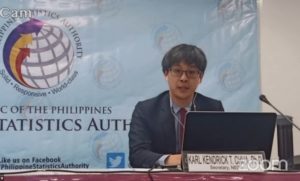
The Philippine economy declined 0.2% in the first quarter of 2020, its first contraction in 21 years, as travel restrictions and community quarantines to prevent the spread of the coronavirus disease (COVID-19) affected businesses and household consumption.
The first quarter 2020 GDP was a reversal from the 6.4% growth in the fourth quarter of 2019 and the 5.7% growth in the same quarter last year.
The Philippines recorded its last GDP contraction in the fourth quarter of 1998 during the Asian financial crisis.
“Our country has faced significant socio-economic risks and shocks during the first quarter of 2020, all totally unexpected: the Taal volcano eruption in January; a significant decline in tourism and trade starting in February due to the COVID-19 pandemic; and the need to implement the enhanced community quarantine (ECQ) in Luzon and other parts of the country starting March,” Acting Socioeconomic Planning Secretary Karl Kendrick Chua said in a statement on May 7.
“Containing the spread of the virus and saving hundreds of thousands of lives through the imposition of the ECQ has come at great cost to the Philippine economy. Our economic growth is showing weaker performance compared to the past two decades. Even so, our priorities are clear: to protect lives and health of our people,” he said.
The main contributors to the decline were manufacturing, transportation and storage, and accommodation and food service activities.
On the supply side, all major sectors of the economy posted weaker growth as only those that provide essential goods and services were allowed to operate during the ECQ.
On the demand side, household consumption significantly slowed down by 0.2% as almost all items posted weaker growth. An exception was household spending on health, which grew by 11.5%, faster than the 6.9% in the fourth quarter of 2019.
Meanwhile, government spending jumped by 7.1%, higher than the 6.4% growth in in the same period last year but slower than the 17% in the fourth quarter of 2019.
In the coming weeks, Chua said the economic team and legislators will work out an economic stimulus program “that will gradually get people back to work, get businesses to normalize; essentially, restart the economy.”
Chua said the COVID-19 crisis “has impressed on us the need to transition to a digital economy.
“Our digital infrastructure needs to be improved; the digital divide needs to be addressed. A number of structural reforms also need to be in place. Before the COVID-19 crisis, we were on track to becoming an upper-middle income country this year. If we can quickly transition to the new normal, we can aspire for so much more,” Chua said.









